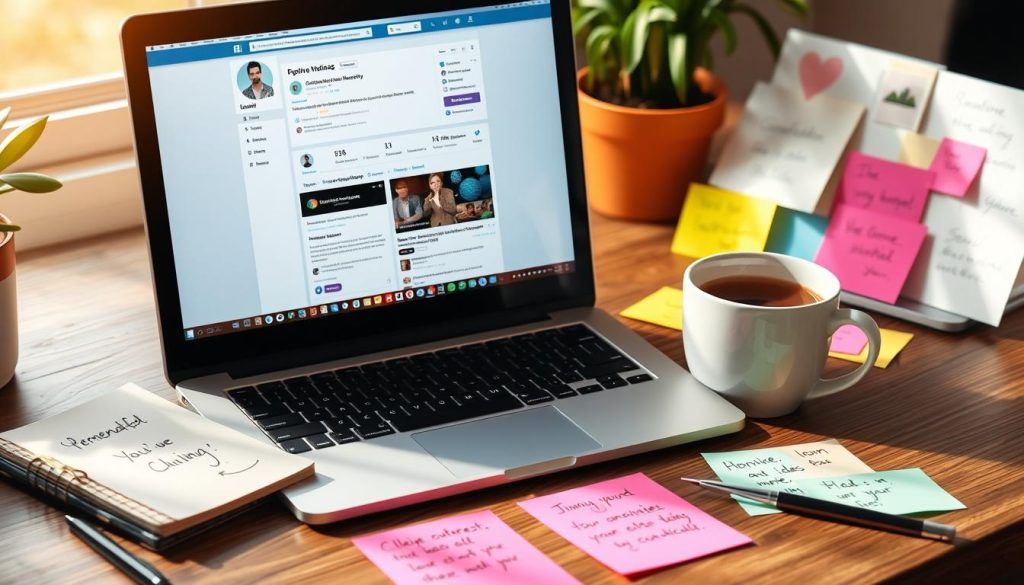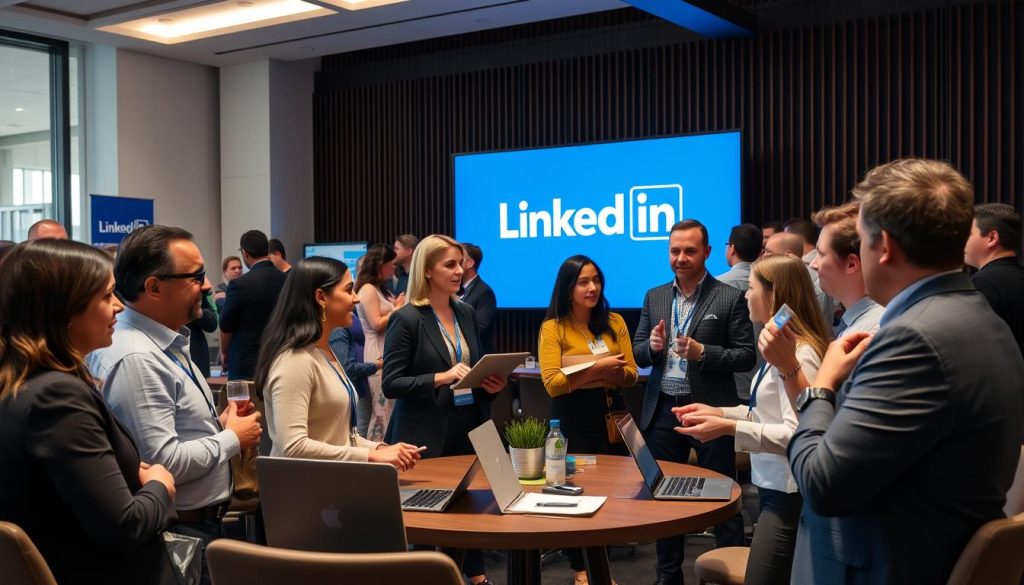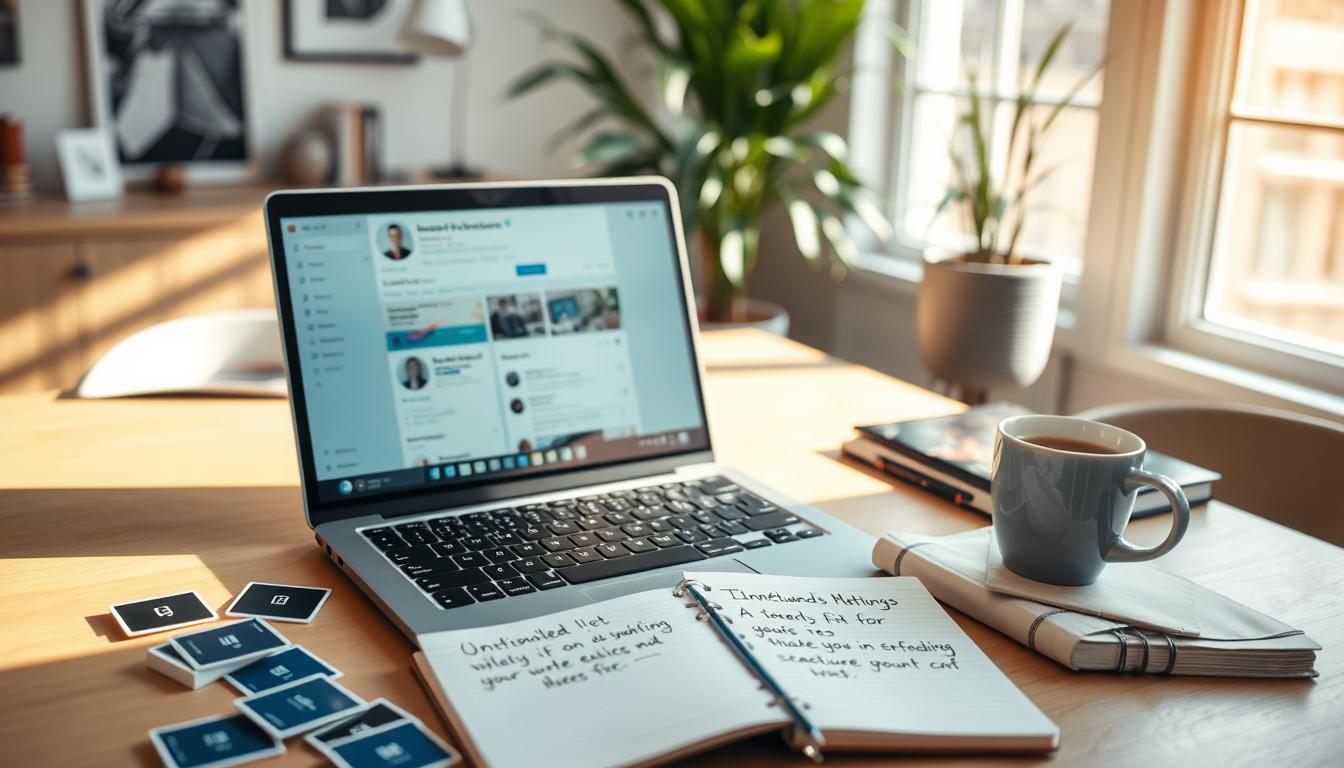The digital world is always changing, and how we network has shifted a lot. By 2025, LinkedIn will be key for making real business connections. Learning to do LinkedIn cold outreach well is crucial for anyone wanting to grow their network, find new leads, and stay competitive.
In this article, we’ll dive into how LinkedIn outreach is changing. We’ll share strategies and tips to help you stand out and build strong, lasting connections. You’ll learn how to make a great LinkedIn profile and craft a targeted outreach plan. This will help you succeed in the LinkedIn world and reach your professional goals in 2025 and beyond.
Key Takeaways
- The growing importance of LinkedIn in professional networking and business connections.
- Strategies for creating a compelling LinkedIn profile that attracts your ideal connections.
- Techniques for identifying and engaging with your target audience on LinkedIn.
- Best practices for personalizing your outreach messages and improving response rates.
- Leveraging LinkedIn’s features and tools to enhance your outreach efforts.
Understanding the Importance of LinkedIn Outreach
LinkedIn has become key for professionals looking to grow their networks and find new chances. As we move towards 2025, the role of LinkedIn in prospecting and converting leads is crucial. This platform has changed how we network, helping us make real connections and advance our careers.
Why LinkedIn is Essential in 2025
LinkedIn’s role as a networking site will only grow in the future. It has a huge user base, smart algorithms, and valuable data. In 2025, smart professionals will use LinkedIn to stay ahead, spot trends, and become leaders in their fields.
Benefits of Effective Cold Outreach
Getting good at cold lead conversion on LinkedIn can help a lot. It lets you grow your network, find new partners, and find new ways to make money. Good cold outreach shows your skills, builds trust, and leads to partnerships that help both sides.
The Changing Landscape of Professional Networking
Networking has changed a lot, with LinkedIn leading the way. We don’t just rely on in-person meetings anymore. In 2025, digital platforms like LinkedIn will rule, and we’ll need to adapt to succeed. Using LinkedIn outreach and its new features will help us stay on top and make the most of it.
Crafting the Perfect LinkedIn Profile
Your LinkedIn profile is a key tool for LinkedIn profile optimization and professional branding. It’s vital for boosting your online visibility and drawing in the right connections.
Key Elements Every Profile Needs
A great LinkedIn profile has several must-haves. A catchy headline that shows what you offer, a detailed summary of your skills and accomplishments, and a full list of your work experience and skills are essential. Don’t forget a professional and friendly profile picture to make a strong first impression.
Utilizing Keywords for Better Visibility
Using relevant keywords in your profile is crucial for better professional branding and visibility. Find the industry terms and skills that match your goals. Then, smoothly add them into your profile.
Making a Strong First Impression
Your LinkedIn profile is often the first thing people see. Make it visually appealing and full of useful information. Use
and other multimedia to boost your online presence and leave a lasting impression.
“Your LinkedIn profile is your digital business card – make sure it’s one that commands attention and respect.”
Focus on these key elements to improve your LinkedIn profile optimization. This will help you stand out as a professional in your field.
Developing a Targeted Outreach Strategy
In today’s fast-changing world of professional networking, a smart LinkedIn outreach plan is key. Knowing your target audience and setting clear networking goals helps you make the most of your outreach. This way, you can find new chances for growth.
Identifying Your Ideal Connections
Start by figuring out who you want to connect with on LinkedIn. Look at your industry, job, and what you want to achieve. This helps you find people who can really help you.
Think about job titles, companies, where they are, and what you both like. This makes your outreach more personal and effective.
Utilizing LinkedIn Analytics for Insights
LinkedIn’s analytics tools offer great data for your outreach strategy. Use your profile insights to see what works best with your network. The platform’s targeting helps you find new people to connect with.
With these insights, you can improve your strategy. This helps you reach your networking goals more effectively.
Setting Clear Goals for Outreach
- Set clear, achievable networking goals that match your career goals. This could be finding a new job, getting leads, or becoming a thought leader.
- Make a plan for your LinkedIn outreach. Decide how many connections to make, messages to send, or groups to join.
- Check how you’re doing and adjust your plan as needed. This keeps you on track and boosts your outreach’s impact.
By planning your LinkedIn outreach carefully, you can open up new opportunities. You’ll also grow your professional network and reach your career goals. Always keep your target audience in mind and use data to guide your networking goals for the best results.
Personalizing Your Connection Requests
In today’s world of professional networking, making your LinkedIn connection requests personal is key. By customizing your messages, you boost your chances of getting a positive response. This can lead to valuable conversations.
The Art of the Personalized Message
Starting with personalized outreach on LinkedIn means knowing your potential connection. Look into their background, interests, and any shared experiences. Then, write a message that shows you’re really interested in connecting.
Examples of Effective Connection Requests
- “Hi [Name], I noticed we’re both passionate about [shared interest or industry]. I’d love to connect and learn more about your experience in [relevant field].”
- “[Name], I admire the work your company is doing in [relevant area]. As someone also interested in [topic], I’d be honored to connect and explore potential opportunities to collaborate.”
- “[Name], I came across your profile and was impressed by your achievements in [area of expertise]. I’d enjoy the chance to discuss [relevant topic] and explore ways we could support each other’s professional goals.”
Avoiding Common Pitfalls
While personalized outreach is vital, it’s crucial to avoid common mistakes. Avoid generic messages and never send how to write cold LinkedIn messages that seem spammy. Instead, aim to build real connections and show your value.

By learning the connection request tips, you can make the most of LinkedIn. It can help you build strong relationships that advance your career.
Engaging Follow-Up Techniques
In the fast-paced world of LinkedIn, the real work starts after you connect. Creating effective LinkedIn follow-up strategies is crucial. It helps grow professional relationships into valuable collaborations.
When and How to Follow Up
Timing is key for LinkedIn follow-up. Aim for 1-2 weeks after connecting. This keeps the momentum going and keeps your connection interested.
- Send a personalized message that connects your initial conversation to shared interests or goals.
- Share relevant articles, insights, or collaboration chances to add value.
- Be genuine and avoid being too pushy or salesy. Building a real rapport is the goal.
Crafting the Perfect Follow-Up Message
Creating the perfect LinkedIn follow-up message is about finding a balance. It should be warm, engaging, and personal, yet professional.
“The most important thing is to be helpful, not promotional. Focus on adding value, not closing a deal.” – LinkedIn Outreach Expert, Jane Doe
Strategies to Keep the Conversation Going
After your first follow-up, the challenge is to keep the conversation alive. Use LinkedIn engagement techniques to keep the dialogue going and deepen your connection.
- Engage with your connection’s content by leaving thoughtful comments or sharing their posts.
- Suggest meeting up for a virtual coffee chat or in-person networking event.
- Introduce your connection to relevant industry contacts or potential collaborators.
By excelling in LinkedIn follow-up, you can turn initial connections into lasting professional relationships. This opens doors to new opportunities for your career and business.
Leveraging LinkedIn Groups and Events
LinkedIn has become a key place for professional networking. It helps you connect with others and grow your network. LinkedIn Groups and Events are two big ways to do this.
How to Find Relevant Groups
Finding the right LinkedIn Groups can be tough. But, with a smart strategy, you can find great networking spots. Look for groups that match your job or interests. Choose ones with lots of members and lively talks.
- Use LinkedIn’s search to find groups that fit your goals.
- Check out groups LinkedIn suggests based on your profile.
- Ask your work friends and industry contacts for group tips.
Participating in Discussions Effectively
After joining groups, it’s time to get involved. Share your knowledge, ask smart questions, and share your thoughts. This makes you a go-to person and helps you make real connections.
- Make comments that add something new to the conversation.
- Start discussions on topics you know a lot about.
- Collaborate with others on projects or ideas.
Utilizing Events for Networking
LinkedIn Events are great for meeting people in your field and beyond. They can be online conferences, local meetups, or webinars. These events are perfect for networking, learning, and making friends.
| Event Type | Benefits |
|---|---|
| Virtual Networking Events | Easy to join, free, and convenient. |
| In-Person Networking Events | Great for face-to-face talks and strong connections. |
| Industry-Specific Events | Meet people who work in your field. |
By using LinkedIn Groups and Events, you can grow your network, boost your career, and find new chances to work together.

Measuring the Success of Your Outreach
In the fast-paced world of professional networking, it’s key to track your LinkedIn outreach success. By watching important metrics and using smart tools, you can learn a lot. This helps you improve your strategies and reach your goals.
Key Metrics to Track
- Connection requests sent and accepted
- Message open and response rates
- Engagement levels (likes, comments, shares)
- Referrals or leads generated from outreach
- Conversions to meetings or sales
Tools for Analyzing Outreach Effectiveness
Using the right tools can greatly help you track and analyze your LinkedIn outreach metrics. Some top choices include:
- LinkedIn Analytics: Gives you detailed insights into your profile, content, and connections
- Hootsuite or Sprout Social: Provide full social media management and reporting
- CRM platforms like Salesforce or HubSpot: Track lead generation and conversion from LinkedIn
Adjusting Strategies Based on Data
The real strength of LinkedIn analytics and performance tracking is in using insights to make changes. By studying your outreach metrics, you can see what works best. Then, you can adjust your strategy to better connect with your audience.
| Metric | Benchmark | Your Performance | Action Items |
|---|---|---|---|
| Connection Request Acceptance Rate | 30-50% | 42% | Refine personalization of requests |
| Message Open Rate | 40-60% | 52% | Optimize subject lines and preview text |
| Response Rate | 20-30% | 25% | Enhance message relevance and tone |
By always checking your LinkedIn analytics, outreach metrics, and performance tracking, you can make smart choices. These choices will help your professional networking grow.
Tech Tools for Improving Outreach
In today’s fast-changing world of professional networking, using technology is key. It’s crucial for mastering LinkedIn cold outreach in 2025. The right tools, from LinkedIn automation tools to CRM integration, can boost your outreach. They help you do it all while keeping your networking ethical.
Overview of Automation Tools
Automation tools have changed how we connect on LinkedIn. They make tasks like personalized message creation, connection requests, and follow-up sequences easier. This lets you spend more time on building real relationships and adding value to your connections.
CRM Solutions for LinkedIn
Linking your LinkedIn with a strong CRM (Customer Relationship Management) system can elevate your outreach. These tools help you manage your connections, track engagement, and get insights to improve your strategies. By linking your LinkedIn and CRM, you get a complete view of your network and make better decisions.
Staying Ethical with Outreach Tools
Technology has changed LinkedIn networking, but using it ethically is vital. It’s important to be responsible and compliant in your outreach. This means respecting privacy, avoiding spam, and using tools to improve networking, not harm it.
By using the right LinkedIn automation tools, CRM integration, and ethical practices, you can improve your outreach. This will help you succeed in the fast-paced world of 2025 and beyond.
Future Trends in LinkedIn Outreach
LinkedIn outreach is changing fast. New technologies are making networking more efficient and personal. We’re moving towards a future where networking is smarter and more connected.
Emerging Technologies Impacting Outreach
Artificial Intelligence (AI) and machine learning are big changes for LinkedIn. They will help find the best connections and write messages for us. Even virtual reality might change how we meet online.
Predictions for Networking in 2026 and Beyond
Video networking will grow, making it easy to talk face-to-face from anywhere. Blockchain could also change how we trust each other online. These changes will make our professional networks stronger.
Staying Ahead in a Competitive Environment
To keep up, we need to be open to new ideas and keep learning. This means trying new platforms and staying up-to-date with trends. Being quick to adapt will help us succeed in the fast-paced digital world.
FAQ
What are the key elements every LinkedIn profile needs?
A good LinkedIn profile has a professional photo, a catchy headline, and a detailed ‘About’ section. It also needs a work experience section and skills endorsements. These elements help you stand out.
How can I utilize LinkedIn analytics to improve my outreach strategy?
LinkedIn analytics give you insights into your connections and content. Look at profile views, connection requests, and engagement rates. This helps you know who to talk to and what to say to make an impact.
What are some effective strategies for personalizing LinkedIn connection requests?
Make your connection requests personal by mentioning shared interests or experiences. Don’t send generic messages. Instead, write a message that shows you’re really interested in the person. This approach can help you get more connections.
When and how should I follow up on LinkedIn connection requests?
Follow up within one to two weeks after sending a connection request. Send a brief, engaging message that reminds them of your initial outreach. Offer something valuable, like an article, and keep the tone friendly.
How can I leverage LinkedIn Groups and Events to expand my professional network?
Find and join LinkedIn Groups that match your industry or interests. Be active in discussions and share useful content. This helps you build credibility and connect with others. Also, use LinkedIn Events to meet professionals in person or online, which can lead to deeper connections.
What are some key metrics I should track to measure the success of my LinkedIn outreach?
Keep an eye on connection request acceptance rates, message open and response rates, and the number of meaningful conversations started. Also, track any leads or business opportunities. Analyzing these metrics helps you improve your LinkedIn outreach.
What are some ethical considerations when using automation tools for LinkedIn outreach?
When using automation tools, be authentic and avoid spamming. Make sure automated messages are clearly labeled as such. Don’t use impersonal tactics. Instead, use technology to help you connect with people, not replace personal outreach.


